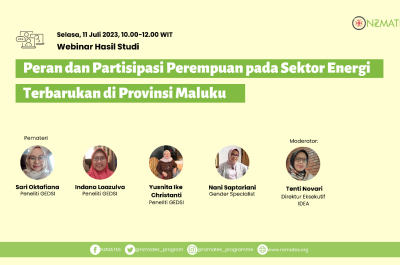
The New Zealand-Maluku Access to Renewable Energy Support (NZMATES) programme hosted a webinar on Tuesday, 11th July 2023, to disseminate the research findings on "The Role and Participation of Women in the Renewable Energy Sector in Maluku Province." This study holds significance as women are in constant contact with energy around the clock. Therefore, it is crucial for policy development and implementation to consider the gender dimension, ensuring inclusivity at the energy level can be achieved.
Ade Soekadis, Executive Director of Mercy Corps Indonesia, conveyed that women still have opportunities to enhance their roles and participation in the energy sector, especially in renewable energy. It is hoped that through this webinar, NZMATES, the government, state-owned enterprises, community leaders, and civil society can collectively push for gender mainstreaming in regulations, policies, and energy sector development. Thus, multi-actor and multi-sector collaboration is critically important.
“Cultural, educational, advocacy, mentoring, and other approaches are priority programmes to realize gender mainstreaming and energy inclusivity in Indonesia,” said Ade.
In line with Ade, Anton Adrian Lailossa, the Head of Bappeda (Regional Development Planning Agency) in Maluku Province, said that research regarding gender mainstreaming in the renewable energy sector is imperative.
“This research is expected to sensitize local governments and all stakeholders so that energy sector policies become more gender-sensitive,” said Anton.
In terms of employment, women still face gender discrimination due to structural issues they must contend with. There is a perception that women are not suited for certain job positions, leading to gender bias in those roles.
“Feelings of isolation due to gender imbalances in the workplace and a lack of academic opportunities or internships persist,” said Marie Irene de Fretes, Senior Community Engagement representative of NZMATES, during her address.
The Importance of Encouraging Women’s Collaboration in the Energy Sector
The renewable energy sector in Maluku Province is still predominantly male-dominated. The Central Statistics Agency (BPS) recorded the labour force situation in Indonesia in August 2021, showing a gender participation disparity in the workforce, with men at 77.6 percent and women at 53.7 percent. Only 40,000 women are employed in the gas and electricity sector, a significantly lower number compared to the 240,000 men in the same field.
In terms of regulations, there are three laws related to energy management: Law No. 30 of 2007 on Energy, Law No. 30 of 2009 on Electricity, and Law No. 4 of 2009 on Mineral and Coal Mining. However, gender mainstreaming has not yet received attention and integration into national regulations in the energy sector, despite gender mainstreaming policies being initiated since 2000.
In the regulations governing renewable energy in Indonesia, as stated in Article 4, paragraphs (2) and (3) of Law No. 30 of 2007, Government Regulation No. 79 of 2014 on National Energy Policy, and Presidential Regulation No. 22 of 2017 on the National Energy General Plan (RUEN), there is no mention of gender mainstreaming. Therefore, the Indonesian Women's Coalition, in its research, proposes Gender Mainstreaming Units (PUG) in the Renewable Energy Bill.
Furthermore, the dominance of men is evident in the National Energy Council members for the 2020-2025 period. As a result, women's voices and quotas are not affirmed in Presidential Regulation No. 26 of 2008 on the Formation of the National Energy Council and the Procedure for Screening Candidates for National Energy Council Members.
For this reason, Maluku’s Provincial government must continue to promote gender mainstreaming in energy sector regulations. This requires cross-sector and multi-sector collaboration, strengthening the capacities of the civil service, especially those related to women's empowerment, village community empowerment, and the energy sector. Strengthening renewable energy management institutions, especially at the village level, to manage implemented renewable energy is crucial.
The study results also indicate the need for advocacy processes for gender equality and justice because some communities in Maluku still exhibit gender blindness. Advocacy is crucial to promote and enhance the blend of renewable energy. Therefore, collaboration with the government is necessary for improved and less gender-biased management of solar and micro-hydro power plants.
